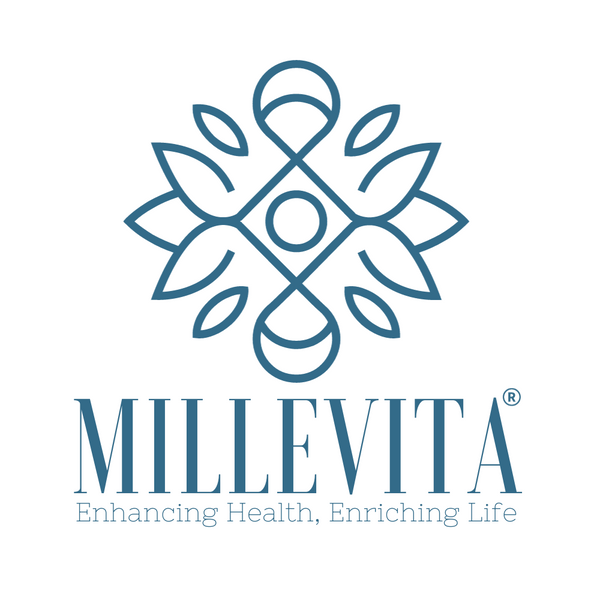

The Sleep–Energy Blueprint: Wake Strong, Live Brighter
Share
Table of Contents
Key Takeaways
- 💤 Quality sleep restores physical and mental energy.
- ⚖️ Balanced hormones from sleep keep energy steady.
- 🧠 Deep sleep boosts focus, memory, and mental clarity.
- 🏋️♀️ Restorative rest rebuilds muscles and fuels endurance.
- 🔄 Good sleep habits create a lasting energy loop.
Why Sleep Powers Your Day
Sleep is your nightly reset—natural, reliable, quietly restorative. While you rest, the body repairs tissue, replenishes cellular fuel and recentres key systems.
When rest is pushed aside by late nights and glowing screens, mornings feel flat and the day leans on stimulants. Make sleep non-negotiable and energy becomes predictable.
Real vitality is built overnight: cells restore, hormones find rhythm, muscles recover, and the brain clears metabolic waste so clarity returns. Guard the night to own the day.
Energy Made at Night
While you sleep, maintenance accelerates: tissues repair, cells are replaced and core systems recalibrate without competing demands.
Mitochondria replenish ATP—the body’s usable energy—so you wake with fresh capacity rather than yesterday’s leftovers.
Stimulants can mask tiredness; they don’t restore it. Consistent, unbroken sleep is the sustainable way to build durable daytime energy.
Hormones in Rhythm, Energy That Lasts
Sleep is when the endocrine system resets its timing. With adequate rest, cortisol follows a healthy morning rise, growth hormone surges in deep sleep to drive repair, and insulin sensitivity stays intact so food becomes fuel.
Aligned hormones feel like steady focus and a clear lift on waking—not a scramble for stimulants.
Cut sleep short and the rhythm unravels: cortisol drifts off-schedule, growth-hormone pulses fade, and insulin control slips—inviting sugar swings, cravings and mid-afternoon crashes.
Overnight Brain Reset
Sleep doesn’t power the brain down—it powers maintenance up. Overnight, the glymphatic network clears metabolic waste and quiets neural noise.
At the same time, memories consolidate and learning is organised, shifting new information from short-term clutter to usable knowledge.
The result is clean mental energy: clearer focus, faster decisions and fewer “why did I come in here?” moments.
Deep Sleep, Durable Energy
Slow-wave sleep is the body’s heavy-lift window: tissues repair, muscle protein synthesis ramps, glycogen stores are refilled and the nervous system resets.
If you train, this is where effort turns into adaptation—stronger fibres, better output next session. If you don’t, it still builds everyday endurance: steadier mood, fewer aches, clearer focus.
Skimp on deep sleep and micro-damage carries forward: recovery stalls, legs feel heavy and energy leaks before lunch.
The Rest–Energy Feedback Loop
Better sleep → higher daytime energy → more movement and steadier mood → deeper sleep that night. It’s a reinforcing cycle that compounds.
Break it and the reverse appears: short sleep lowers drive, activity drops, and the next night is lighter and fragmented—cue 2 a.m. wake-ups and 7 a.m. snooze taps.
Protect the loop: prioritise consistency, daylight and movement; keep evenings low-stimulation. Let recovery build on itself.
Sleep & Immune Resilience
Insufficient sleep blunts immune readiness. Surveillance slows and responses become less coordinated, leaving you more susceptible to everyday bugs.
With consolidated, quality sleep, the body releases protective cytokines, supports antibody formation and maintains natural-killer cell activity—defences that help you fend off illness and recover faster.
Protecting sleep protects energy and health: fewer sick days, steadier stamina and a system that’s ready when it matters.
Smart Naps, Sharper Afternoons
Brief, deliberate naps offer a fast reset—without replacing night-time sleep. When used well, they lift focus, mood and performance through the mid-afternoon dip.
Keep them short: 10–20 minutes helps you wake clear and avoids sleep inertia. Aim for early afternoon (around 1–3 p.m.) so bedtime stays intact.
Treat naps as a strategic boost, not a daily crutch. If you need long or frequent naps, it’s a signal to improve your night sleep routine.
Quality Over Hours
Eight hours on the clock doesn’t guarantee restoration. If sleep is light, broken or restless, you’ll tick the time box and still wake under-charged.
Quality means smooth cycles through light, deep and REM with minimal wake-ups. Favour a cool (≈17–19°C), dark, quiet room; keep a consistent schedule; dim lights at night and park screens/alcohol close to bedtime.
The target is both enough hours and high-quality sleep. Count the time, protect the depth—energy comes from the combination.
Fuel for Better Sleep
Evening choices set the tone for the night. Heavy, late meals keep digestion busy and push back deep sleep; spicy or high-sugar options can do the same.
Make it simple: balanced dinner a few hours before bed, caffeine cut-off by midday–2 p.m., and go easy on alcohol if you want solid REM.
Hydration matters too. Aim for steady fluids across the day, then taper after dinner so you’re not up for midnight trips. Arrive in bed nourished, not overfull; hydrated, not sloshed.
Simple Rituals for Reliable Sleep
Good sleep isn’t luck—it’s rhythm. Most fixes are free and repeatable; consistency beats gadgets every time.
- Keep a stable sleep/wake window (±30 minutes), weekends included.
- Get morning daylight within 30–60 minutes of waking (10–20 minutes outside).
- Make the room cool, dark, and quiet (≈17–19°C; use a blackout curtain or eye mask, and earplugs/white noise).
- Dim lights and park screens 30–60 minutes before bed.
- Use short naps (10–20 min, early afternoon) as a boost—not a substitute for night sleep.
Repeat the routine and your body will follow: more profound sleep, steadier energy, more precise focus.
Sleep Support — Botanicals & Nutrients
Daily Sleep–Energy Check
Keep energy reliable by ticking the basics. One minute, once a day.
Small wins compound. Protect the routine and your days get brighter—no extra coffee required.
FAQs
You can recover a little, but it’s like paying the credit card minimum—debt remains. Consistent nightly sleep keeps energy steady.
You wake refreshed, don’t need emergency coffee, and bounce back from workouts. Trackers help, but how you feel wins.
Keep them short (10–20 min) and early afternoon. Long or late naps can push bedtime into tomorrow.
Regular training improves sleep depth. Save intense sessions for morning/afternoon; late‑night HIIT can wire you.
Make Nights Fuel Your Days
Sleep is core infrastructure for the body and brain. Every quality hour is a deposit into tomorrow’s energy, focus and resilience.
When nights run well—hormones align, the brain clears waste, muscles rebuild, and immunity stays ready—daytime performance compounds. Cut corners and you’ll feel the drag everywhere.
Treat bedtime as a non-negotiable appointment with your future self. Guard the routine, keep it calm and consistent, and let recovery do the heavy lifting.
Disclaimer
This content is for informational purposes only and is not a substitute for professional medical advice, diagnosis or treatment. Always consult a qualified healthcare professional regarding your individual circumstances. For our full health disclaimer, please see this page.
References
- Harvard Health – How sleep boosts your energy. Retrieved August 10, 2025.
- NIH – Benefits of slumber. Retrieved August 10, 2025.
- NCBI – Physiology, Sleep Stages. Retrieved August 10, 2025.
- Sleep Foundation – Athletic performance & sleep. Retrieved August 10, 2025.
- PMC – Glymphatic system & sleep. Retrieved August 10, 2025.
- Springer – Glymphatic clearance. Retrieved August 10, 2025.
- Wiley – Sleep & metabolism. Retrieved August 10, 2025.
- ScienceDirect – Sleep quality. Retrieved August 10, 2025.
- Frontiers Endocrinology – Hormones. Retrieved August 10, 2025.
- Harvard – Brain toxins & sleep. Retrieved August 10, 2025.
- JNeurosci – Sleep & memory. Retrieved August 10, 2025.
- Hopkins – Sleep/wake cycles. Retrieved August 10, 2025.
- NHLBI – Healthy sleep habits. Retrieved August 10, 2025.
- American Heart Association – Sleep quality. Retrieved August 10, 2025.
- Harvard – Power naps. Retrieved August 10, 2025.
- BMC Sleep – Sleep interventions. Retrieved August 10, 2025.
- PubMed – Sleep & insulin. Retrieved August 10, 2025.
- ScienceDirect – Hydration & sleep. Retrieved August 10, 2025.
- Harvard – Sharper thinking. Retrieved August 10, 2025.
- ACSM – Sleep & performance. Retrieved August 10, 2025.
- Better Health – Sleep deprivation. Retrieved August 10, 2025.
- Journal of Endocrinology – Cortisol rhythms. Retrieved August 10, 2025.






